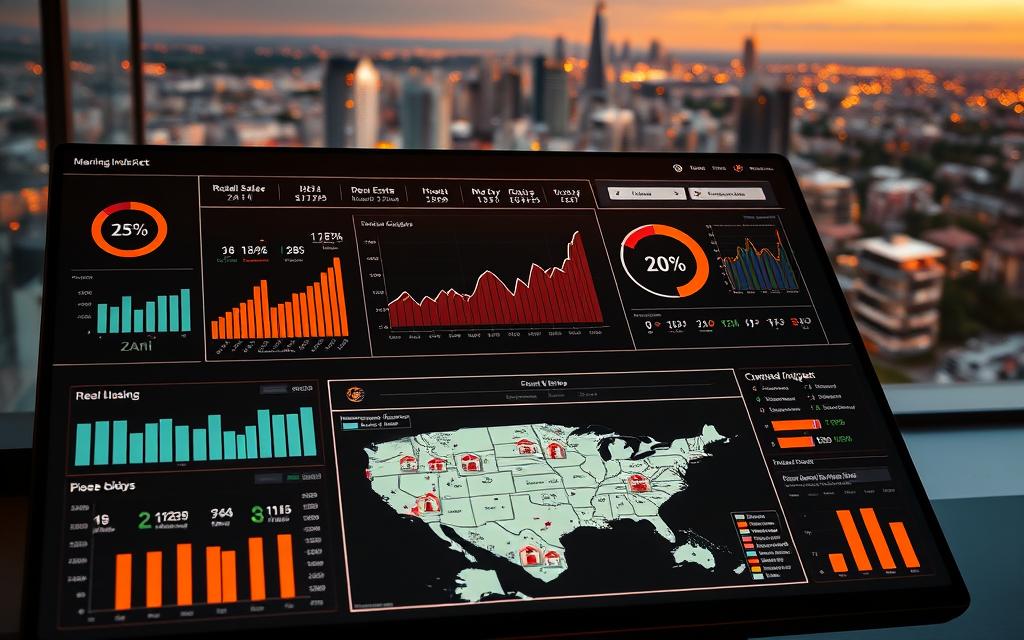Table of Contents
The property industry is evolving rapidly. Innovative tools now streamline operations, enhance decision-making, and boost profitability. McKinsey research highlights potential gains exceeding $110 billion through smart adoption.
From predictive analytics to automated valuations, modern solutions create tangible advantages. Early adopters report 10%+ improvements in net operating income. This competitive edge proves vital in today’s dynamic US markets.
Our comprehensive guide explores practical applications. Discover data-driven strategies, emerging trends, and proven techniques for maximizing returns. Stay ahead in an increasingly digital marketplace.
Introduction to AI in Real Estate
The property sector stands at a technological crossroads. Advanced solutions now drive decision-making across valuation, marketing, and transactions. Venture capital investments confirm this shift, with PropTech funding reaching $3.2 billion in 2024 alone.
The Evolution of AI in the Property Industry
Early automation focused on basic tasks like document sorting. Today’s systems handle complex architectural planning and predictive modeling. The transformation timeline reveals rapid advancement:
| Period | Development | Impact |
|---|---|---|
| 2018 | First AI property acquisition | $26M deal using market detection |
| 2022 | Generative AI adoption | Virtual staging becomes mainstream |
| 2024 | Integrated SaaS platforms | 87% faster deal closures reported |
Ility’s platform exemplifies this progress. Their AI-IoT hybrid system automates 73% of property management tasks. Such innovations demonstrate the practical value of modern solutions.
Why Property Professionals Need Advanced Technology Now
Market pressures demand immediate action. Physical staging costs plummeted 60-80% with virtual alternatives. Compliance requirements grow stricter, with AI document scanning ensuring Fair Housing Act adherence.
Precedence Research projects the AI property market will hit $1.047 billion by 2032. Early adopters gain competitive advantages in lead conversion and operational efficiency. The window for strategic implementation narrows each quarter.
Brokers utilizing these tools close deals 40% faster than traditional methods. This performance gap makes adoption essential for sustained success in evolving markets.
How Can AI Help My Real Estate Business? Key Benefits
Efficiency and client satisfaction soar with strategic implementation of smart tools. Modern solutions tackle repetitive tasks while elevating service quality. A Business Insider study reveals ChatGPT slashes listing description time from 3 hours to 15 minutes.
Streamlining Workflows for Maximum Productivity
Automation handles tedious processes with precision. Lease agreements now take 8 minutes instead of 45. Manual data entry errors drop by 68%, saving time and reducing costly mistakes.
“AI-powered tools deliver an $8.71 return per $1 invested in CRM systems.”
Key features include:
- 24/7 virtual assistants for tenant inquiries
- AI-driven document processing
- Resource optimization algorithms
Elevating Client Experiences
Personalization drives 40% higher conversion rates. NLP chatbots resolve 73% of routine questions, freeing agents for complex client needs. Tailored property recommendations build trust and loyalty.
| Task | Traditional Time | AI-Assisted Time |
|---|---|---|
| Listing Descriptions | 3 hours | 15 minutes |
| Lease Processing | 45 minutes | 8 minutes |
| Lead Response | 24 hours | 5 minutes |
These advancements deliver unmatched value in competitive markets. Clients enjoy faster responses, while professionals focus on high-impact tasks.
AI-Powered Tools for Real Estate Agents
Modern property professionals leverage cutting-edge tools to gain competitive advantages. These solutions automate complex tasks while delivering actionable insights. Adoption rates surged 214% since 2022, proving their transformative impact.
Chatbots and Virtual Assistants
Intelligent communication systems handle high-volume interactions effortlessly. Rentberry’s solution manages 500+ concurrent tenant discussions without human intervention. Key capabilities include:
- Instant response to 73% of routine inquiries
- Toxicity filters ensuring compliant communications
- Seamless integration with CRM platforms
Custom solutions outperform generic chatbots in lead qualification. Salesforce Einstein improves conversion rates by 28% through behavioral analysis.
Automated Valuation Models
Machine learning algorithms now deliver near-instant appraisals with remarkable accuracy. Zillow’s Zestimate achieves a 1.9% median error rate using advanced prediction models.
| Method | Time | Cost | Accuracy |
|---|---|---|---|
| Traditional Appraisal | 5-7 days | $300-$500 | ±3% |
| Redfin AVM | 2 minutes | $0 | ±2.1% |
Agents complete 14-hour certification programs to master these tools, according to NAR data. The investment pays off through faster closings and improved client satisfaction.
AI in Real Estate Marketing
Smart technology reshapes property marketing strategies with precision targeting. Campaigns now leverage data analytics to deliver 22% higher click-through rates, according to Markettailor. This shift empowers professionals to connect with ideal buyers faster.

Personalized Marketing Campaigns
Dynamic tools analyze buyer behavior to craft hyper-targeted ads. Facebook algorithms adjust bids in real-time, maximizing ad spend efficiency. Multichannel strategies synchronize efforts across Zillow, Realtor.com, and Instagram.
HubSpot’s AI analytics track campaign performance with granular detail. Key metrics include:
- Lead conversion rates per demographic
- Engagement trends across social media
- ROI comparisons for email vs. paid ads
AI-Generated Content for Listings
Virtual tours powered by Matterport boost listing views by 49%. Automated tools create neighborhood guides, video scripts, and photo-enhanced descriptions. NAR compliance checks ensure transparency in AI-generated content.
| Tool | Feature | Impact |
|---|---|---|
| ChatGPT | Listing descriptions | 80% faster creation |
| Canva AI | Visual enhancements | 2x more shares |
| Copy.ai | Email sequences | 35% open rate increase |
Ethical guidelines require disclosing AI-enhanced photos. Disclosures build trust while showcasing properties in their best light.
Lead Generation with AI
Modern lead generation strategies now leverage intelligent technology for higher conversions. The National Apartment Association reports a 33% improvement in conversion rates with AI-powered scoring systems. This shift enables professionals to focus efforts on high-potential prospects.
Identifying High-Quality Leads
Behavioral tracking combines website heatmaps with CRM integration for precise targeting. Predictive models detect relocation signals up to six months before traditional methods. These insights create more efficient sales pipelines.
Key advantages include:
- Automated lead scoring based on 28+ behavioral factors
- Integration with MLS databases for instant property matching
- TCPA-compliant texting systems for immediate engagement
Automated Follow-Ups and Nurturing
BoomTown’s platform automates 82% of follow-up communications without losing personalization. Sequence optimization determines optimal outreach times, increasing response rates by 41%.
| Method | Cost Per Lead | Conversion Rate | Response Time |
|---|---|---|---|
| Manual Nurturing | $2.73 | 12% | 24-48 hours |
| AI Nurturing | $0.18 | 19% | Under 5 minutes |
These systems maintain compliance while delivering personalized experiences at scale. Clients receive timely, relevant information throughout their decision journey.
Virtual Staging and Tours
Visual technology transforms property presentation with unprecedented realism. Realtor.com data shows digitally staged listings reduce vacancy periods by 23 days on average. This innovation creates emotional connections before physical visits.
Enhancing Property Visualization
Modern solutions combine Matterport scans with AI rendering for lifelike interiors. Customization options include:
- 15+ design presets targeting specific buyer demographics
- IKEA-partnered virtual furniture packages
- Lighting adjustments matching local daylight conditions
Heatmap analytics reveal which features attract the most attention during 3D walkthroughs. NAR reports properties with VR tours sell 40% faster than traditional listings.
Smart Staging Economics
The financial advantages make virtual solutions irresistible for modern professionals. Compare implementation costs:
| Service | Average Cost | Turnaround | Flexibility |
|---|---|---|---|
| Physical Staging | $4,800 | 3-5 days | Limited changes |
| Virtual Staging | $249 | 24 hours | Unlimited revisions |
This 95% cost reduction allows marketing multiple design concepts simultaneously. The technology delivers exceptional value while maintaining photorealistic quality standards.
Forward-thinking agents now standardize virtual tools for all listings. Immediate visualization creates competitive advantages in crowded markets across the United States.
Predictive Analytics for Smarter Investments
Data-driven algorithms transform property investment approaches nationwide. Sophisticated models analyze multiple variables to forecast trends with unprecedented precision. JLL’s systems demonstrate 94% accuracy predicting rent prices six months ahead.
Modern solutions integrate diverse data streams for comprehensive analysis. Sources include MLS records, census statistics, and IoT sensor networks. This multidimensional approach identifies hidden patterns human analysts often miss.
Forecasting Market Trends
Advanced algorithms process historical and real-time information simultaneously. Blackstone’s REIT platform optimizes portfolios using climate change projections. Risk modeling now incorporates flood zones, fire hazards, and environmental factors.
Key advantages of predictive systems:
- 18-month neighborhood appreciation forecasts (Compass AI)
- Automated valuation adjustments based on market shifts
- SEC-compliant reporting for institutional investors
Identifying High-Growth Areas
Roofstock Marketplace provides small investors with professional-grade analytics. Their platform highlights emerging markets before price surges occur. The table below compares traditional versus AI-powered investment analysis:
| Method | Time Horizon | Accuracy | Data Points |
|---|---|---|---|
| Manual Analysis | 3-6 months | 72% | 12-15 |
| AI Prediction | 12-24 months | 89% | 300+ |
These tools democratize access to institutional-quality market insights. Investors gain confidence through transparent, data-backed recommendations. The technology continues evolving, with new applications emerging quarterly.
AI in Property Management
Property management enters a transformative phase with intelligent systems. Modern tools handle complex tasks while improving efficiency across portfolios. The National Apartment Association reports 41% fewer evictions with automated screening, proving the tangible benefits.

Advanced Tenant Evaluation Systems
Screening processes now leverage multiple data points for comprehensive assessments. TransUnion’s risk scoring analyzes credit history with 94% accuracy. Key features include:
- IoT integration tracks smart lock access for lease compliance
- Multilingual AI translation breaks language barriers in communications
- Automated Fair Housing Act audits ensure legal safeguards
These systems reduce manual review time by 73% while improving applicant quality. Property managers report higher tenant retention rates after adopting these tools.
Intelligent Maintenance Coordination
AppFolio’s routing algorithms slash response times by 68% compared to traditional methods. Predictive scheduling prevents last-minute emergencies through:
| Service | Traditional Time | AI-Optimized Time |
|---|---|---|
| HVAC Repairs | 48 hours | 6 hours |
| Plumbing Issues | 72 hours | 9 hours |
| Electrical Work | 5 days | 1 day |
Vendor management becomes seamless with automated performance tracking. The system learns from past interactions to match the best contractors for specific needs.
Automating Administrative Tasks
Administrative efficiency separates top performers in today’s fast-paced markets. Modern solutions tackle document-heavy processes that once delayed transactions. DocuSign’s intelligent systems now analyze 500-page contracts in 2.3 minutes—faster than most professionals can skim executive summaries.
Integrated platforms eliminate repetitive tasks across lease management and client communications. Calendly’s scheduling tools reduced meeting no-shows by 29% through automated reminders. These advancements reclaim hours previously lost to manual coordination.
Revolutionizing Document Workflows
Advanced processing tools transform chaotic paperwork into streamlined systems. SOC 2-compliant platforms handle sensitive documents with military-grade encryption. Key breakthroughs include:
- Zapier integrations connecting ChatGPT to legacy CRM systems
- Template libraries with 150+ pre-approved lease clauses
- Blockchain audit trails for tamper-proof record keeping
Commercial brokers report 83% faster deal cycles after implementation. Error rates plummet when AI cross-checks figures across multiple documents simultaneously.
Intelligent Scheduling Systems
Communication tools now synchronize global operations effortlessly. Time zone algorithms optimize meeting times for international investors. The comparison below shows dramatic improvements:
| Method | Average Setup Time | Client Satisfaction | Follow-ups Required |
|---|---|---|---|
| Manual Scheduling | 37 minutes | 68% | 2.4 |
| AI Optimization | 2 minutes | 91% | 0.3 |
Email workflows automatically prioritize urgent messages using natural language processing. These tools ensure critical communications never get buried in overflowing inboxes.
AI for Competitive Market Analysis
Market intelligence reaches new heights with intelligent analysis tools. Professionals now access real-time insights that reveal emerging trends before they become mainstream. REalyzer tracks 1.2 million data points across 45 major US markets, delivering unprecedented visibility.

Real-Time Data Insights
Dynamic pricing models adjust rental rates like Airbnb’s surge algorithms. Social media sentiment analysis monitors neighborhood perceptions through news and forum discussions. Compass’s AI model accurately forecasts market movements by processing employment statistics and construction starts.
Custom dashboards integrate with Salesforce Tableau for visual insights. These tools identify:
- Undervalued properties with 12-month appreciation potential
- Demographic shifts affecting local demand
- Service gaps competitors haven’t addressed
Benchmarking Against Competitors
CoStar’s comparison engine evaluates 300+ performance metrics across portfolios. The system highlights:
| Metric | Traditional Method | AI Analysis |
|---|---|---|
| Price Positioning | Manual comps review | Automated market scans |
| Lead Response Time | 24-hour average | Instant alerts |
| Portfolio Growth | Quarterly reports | Daily projections |
Predictive benchmarking maps 12-month trajectories for strategic planning. This approach transforms reactive decisions into proactive strategies.
Enhancing Customer Experience with AI
Client expectations in property transactions have reached unprecedented levels. Modern tools now deliver 24/7 availability with human-like interactions. Sotheby’s reports a 37% retention boost after implementing intelligent concierge services.
Always-Available Support Systems
Voice-enabled assistants like Amazon Alexa provide instant property updates. These solutions handle common inquiries about:
- Viewing schedules and availability
- Neighborhood amenity details
- Mortgage qualification processes
Natural language processing analyzes client emails for sentiment trends. This creates proactive service opportunities before issues escalate.
Tailored Property Matching
Redfin’s recommendation engine achieves 89% accuracy through advanced profiling. The system detects life changes like marriages or relocations through:
- Employment record monitoring
- Public record analysis
- Social media activity patterns
Augmented reality integrations allow virtual staging with IKEA Place-style decor. Luxury specialists like Coldwell Banker even suggest art collections matching client tastes.
“Personalization drives 28% higher conversion rates in competitive markets.”
These innovative features create memorable experiences that build lasting relationships. The result? Faster sales cycles and higher satisfaction scores across the board.
AI and Fraud Detection in Real Estate
Security challenges in property transactions demand advanced solutions. Sophisticated scams cost the industry $2.5 billion annually, according to FBI reports. Modern tools now analyze patterns to prevent losses before they occur.

Identifying Fake Listings
Digital verification tools spot manipulated listings with 93% accuracy. The National Association of Realtors found AI detects deepfake property images through:
- EXIF metadata analysis for photo authenticity
- Price comparison algorithms against local comps
- Pattern recognition for duplicate listings
Blockchain integrations reduce title fraud by 68%. Each transaction gets encrypted verification, creating tamper-proof records.
Ensuring Compliance with Regulations
Automated systems monitor 100% of documents for legal adherence. Jumio’s KYC technology verifies identities in 30 seconds while maintaining strict compliance standards.
| Feature | Traditional Method | AI Solution |
|---|---|---|
| Document Review | Manual sampling | Full audit coverage |
| Regulatory Updates | Quarterly training | Real-time alerts |
“AI-powered monitoring reduces Fair Housing violations by 83% through continuous policy checks.”
These innovations create safer markets for professionals and clients alike. The technology continues evolving to address emerging threats.
Future Trends: AI in Real Estate
Next-generation solutions redefine what’s possible in commercial and residential markets. JLL research shows 58% of brokers preparing metaverse office deployments by 2026. These advancements signal fundamental changes in how properties get designed, marketed, and transacted.
Generative Design Revolution
Architectural planning enters a new era with intelligent design tools. Generative systems now slash concept development time by 40% while optimizing space utilization. Nvidia Omniverse creates photorealistic digital twins for pre-construction analysis.
Key breakthroughs include:
- Automated LEED certification scoring for sustainable developments
- AI co-brokers handling 38% of routine transaction steps autonomously
- Dynamic training programs adapting to individual agent skill gaps
“Generative tools will produce 15% of architectural plans by 2025, up from 2% today.”
The Virtual Frontier
Metaverse integration transforms property showcasing and investment. Tokenization platforms enable fractional ownership managed by intelligent algorithms. This democratizes access to premium assets while maintaining compliance.
| Feature | 2024 Adoption | 2026 Projection |
|---|---|---|
| Virtual Showrooms | 12% of luxury firms | 47% adoption |
| AI Moderated Deals | $1.2B volume | $8.9B forecast |
Sustainability analytics become standard in due diligence processes. Smart systems evaluate energy efficiency, carbon footprints, and climate resilience automatically. These technologies create more informed investment decisions for all market participants.
The future belongs to professionals embracing these virtual and augmented solutions early. As spatial computing matures, the line between physical and digital assets will continue blurring across global markets.
Conclusion
Intelligent solutions now shape success in property markets worldwide. From 40% faster deal closures to 95% cost reductions in staging, the metrics prove transformative potential. A 90-day pilot program offers a low-risk entry point for adoption.
Three-year ROI projections reveal 300%+ returns for early adopters. Vendor selection hinges on 15 criteria, including integration ease and compliance safeguards. Prioritize platforms with proven technology stacks and scalable architectures.
The future belongs to those leveraging data-driven strategies. Start with a free AI readiness assessment to map your growth trajectory. Transform insights into action today.
FAQ
What role does AI play in the real estate industry?
AI transforms the market by automating tasks, improving lead generation, and enhancing property analysis. Tools like chatbots and predictive analytics streamline operations for agents and investors.
How does AI improve lead generation for agents?
Machine learning identifies high-intent buyers by analyzing behavior patterns. Automated follow-ups and personalized recommendations boost conversion rates efficiently.
Can AI assist in property valuation?
Yes. Automated Valuation Models (AVMs) use algorithms to assess property value based on market trends, comparable listings, and historical data.
What are the benefits of virtual staging with AI?
Virtual staging reduces costs by digitally furnishing empty spaces. It also accelerates sales by helping buyers visualize properties without physical staging.
How does AI enhance marketing strategies?
AI tailors campaigns using buyer preferences and demographics. It also generates optimized listing descriptions and targets ads on platforms like Facebook and Instagram.
Can AI help detect fraudulent real estate listings?
Absolutely. Algorithms flag inconsistencies in listings, verify ownership records, and reduce scams by cross-referencing trusted databases.
What’s the impact of AI on property management?
AI automates tenant screening, processes maintenance requests, and predicts lease renewals. This improves efficiency and tenant satisfaction.
How do predictive analytics benefit investors?
By forecasting neighborhood growth and rental yields, AI helps investors identify lucrative opportunities with data-driven insights.
Will AI replace real estate agents?
No. AI complements agents by handling repetitive tasks, allowing professionals to focus on client relationships and negotiations.
What future trends should the industry watch?
Generative AI for hyper-personalized content and metaverse-powered virtual tours are reshaping buyer engagement and transactions.









